July/August 2024
Dear Friends of PiAf,
This time of year always brings a wide range of emotions for our organization as we transition from one fellowship cohort to the next. I am so profoundly proud of the work that our 2023-24 Fellows have accomplished with their host organizations and I hope that you have enjoyed getting to know them over the course of these past 12 months. We look forward to following them as they take their next steps into the world, and know full well that their time with Princeton in Africa will continue to influence and shape the trajectory of their careers. This sentiment is perhaps best expressed by 2023-24 Fellow, Idongesit Ikpang:
“It has been a year of service and will truly become a commitment for a lifetime. My journey with this amazing community has only just begun.”
One of the greatest highlights of our 2023-24 fellowship year was the launch of our Nexus program. As the only program of its kind across the African continent, Nexus further positions us as the premier and longest-standing provider of post-graduate fellowships in Africa. I am so grateful for the commitment of our dedicated Board and staff who worked tirelessly to help bring this program to life. Additionally, I am excited about the opportunity that Nexus affords us to answer the call from motivated and visionary young African leaders who are eager to expand their professional development skills while supporting our many amazing partner organizations.
In this fantastic edition of our Fellows Flyer, I’m happy to share our final field notes from our 2023-24 cohort. I hope you enjoy these incredible testimonials from these dynamic young people:
As we continue to look forward, I am energized by the incredible drive and commitment that we have already experienced with our 2024-25 fellowship class. This group of dynamic young leaders, including 4 Nexus Fellows, stem from a wide variety of backgrounds and bring an immense amount of talent and expertise to our growing community. Collectively, they represent 10 nationalities from around the globe, and 22 unique colleges and universities. We look forward to sharing their journey with you over the course of the next 12 months as they settle into their new positions across 10 different African countries.
I hope that this update finds you well. As we continue to evolve as an organization, I am beyond excited for the opportunities ahead to respond to the call from countless young people who are eager to engage in postgrad service, build their professional networks, and enhance their understanding of global relations and ethical partnerships. Together, we are making a significant impact and I remain incredibly grateful for your ongoing support.
In gratitude,
Dami Akinyele Wolfgarten
Executive Director
PiAf Connections
Please click below to check out pictures of our Fellows, Alums and other members of the PiAf family meeting up at home and around Africa.
Notes from the Field
By Rachael Mutisya, '23-24 Fellow with Mpala Research Centre
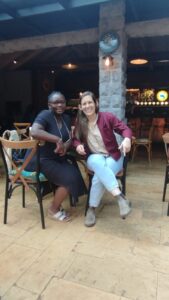
Rachael (left) grabs lunch with her mentor, Emma Impink (2011-12 Fellow at The BOMA Project, Kenya).
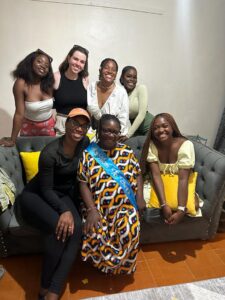
Rachael (center) with her fellow 2023-24 Fellows Malaika Ogukwe, Sinnah Lamin, Eva Barasa, Emily Langlois, MaCie’ Moore, and Haby Sondo.
As a 2023-2024 PiAf Nexus Fellow working with Mpala Research Centre in Laikipia, Kenya, my time here has been transformative. From navigating the wilderness to observing the gentle personalities of elephants, my experiences have been profoundly enriching. I collaborate closely with researchers, maintenance teams, and various departments to showcase their incredible work through compelling visuals and stories. I have had the responsibility of interviewing staff about their work and experiences at Mpala, and showcasing their efforts has been a tremendous experience.
At Mpala, I create captivating blogs, design eye-catching graphics—which I have grown to enjoy despite initial reservations—and keep our website and newsletters up-to-date. I also develop the social media calendar, schedule posts, and manage our online presence. My favorite part of the job is collaborating with researchers in the field, capturing photos to highlight their groundbreaking work, and attending conferences. Last August, I had the privilege of attending the 1st Wildlife Scientific Conference in Naivasha, Kenya, under the theme “Use of Wildlife Science for Enhanced Biodiversity Conservation and Improved Livelihoods.” Organized by the Wildlife Research & Training Institute (WRTI), this event provided valuable insights into wildlife research and opportunities to network with researchers and partners.
Working with Mpala from Nairobi (where I’m from) has strengthened my relationships with family, including my son, and other PiAf fellows in Nairobi. My mentor has been a great source of support and guidance. We had the privilege of meeting in person to discuss my experiences, how to navigate working in Nairobi while the team was in Laikipia, and how to grow my career in the nonprofit industry. I have learned to impact the community and break down complex scientific terms on research to our target audience, contributing to conservation in the wildlife sector. This fellowship has also enabled me to build new
international friendships and express myself more effectively.Notes from the Field
By Hannah Zaveri, '23-24 Fellow at Rwanda School Project
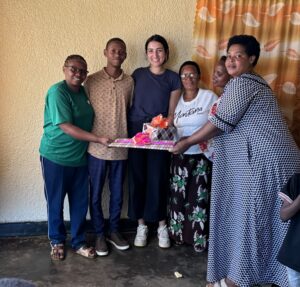
Hannah (center) celebrates her student Emile’s acceptance into college with his family. A recent RLS graduate, Emile will attend Amherst College this fall on a full scholarship.
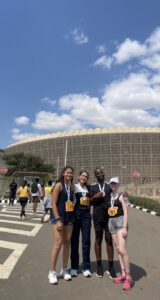
Hannah (center) at the Kigali Peace Half Marathon with friends.
In my eleven months at Rwamagana Leaders’ School (RLS), I’m most grateful for the strong relationships I’ve formed with students and staff. Part of my role is working with a small group of RLS seniors and recent graduates as the RLS college access counselor. Getting to know these students as I guide them through international college applications is incredibly rewarding. Recently, I successfully applied for HALI (high-achieving, low-income) Access Network membership to improve RLS’ college access program. HALI membership means RLS is part of a well-established community of non-profit organizations supporting high-achieving, low-income students in securing quality post-secondary education. The credibility and resources that come with HALI membership will increase RLS’ capacity to help students, and I’m proud of getting RLS into this network.
In addition to my work in the college access space, I’ve had the opportunity to lead a variety of programming at RLS. One of the events I coordinated included collaborating with community health workers to facilitate sexual and reproductive health workshops. This public health education work partly inspired me to pursue my master’s in public health, which I’ll be starting in London this fall.
Outside work, I’ve enjoyed watching football matches in town with RLS teachers. Many of them never miss a game, especially if Arsenal is playing. Football brings people together in Rwamagana, and cheering for Arsenal alongside my co-workers has helped me further connect with my Rwamagana community.
Notes from the Field
By Chukwunwike "CJ" Okoye, '23-24 Fellow in Kampala, Uganda
In undergrad, there was a professor who would always ask “the million-dollar question”: In what manner can cash be deployed to maximize developmental outcomes in peripheral countries? It was a challenge to contextualize economic principles along with relevant needs and opportunities. Of course, there is no single answer; no ball of yarn that can roll out without several knots needing to be addressed first.
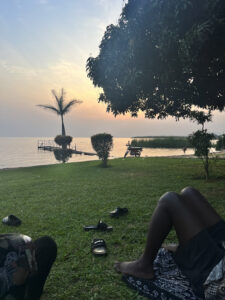
Sunset at Lake Victoria with CJ and friends.
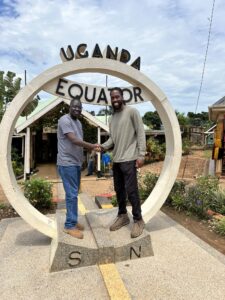
CJ (right) and his supervisor/regional manager John at the equator in Uganda.
My infrastructure development organization delivers infrastructure projects throughout Africa. While our project emphasis is on renewable energy and transportation, there are projects that involve other development components, such as water treatment facilities. As a project developer, I support our team in reaching various milestones, from land acquisition to financial close. Currently, I’m working on a 120 MW wind farm and a 60 MW battery energy storage system.
To give further context, in project development it’s imperative to have rights to the land, an off-taker who will buy the product or services produced by the project, and a feasibility study outlining the project’s viability. These items can be broken down further to create milestones leading to final delivery. These are long-term projects that can take an average of 5-7 years to complete.
It’s truly been an enlightening experience. Since all the projects on the docket are in different stages of development, I’ve been able to gain deep insight in only 11 months. I’m grateful to work alongside such a knowledgeable and dedicated group of individuals. Along with my colleagues, Kampala has left a distinct impression. I look forward to my inevitable return.
Notes from the Field
By David Smith, '23-24 Fellow at Warc
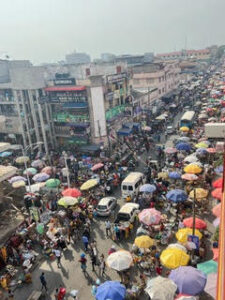
The Makola Market in Accra.
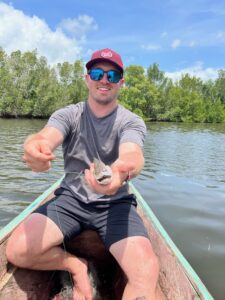
Below: David goes fishing!
Akwaaba! I am currently working as a 2023-2024 Monitoring and Evaluation fellow at Warc Africa, based in Accra, Ghana. The opportunity has allowed me to build on my education while exploring new career territory, providing me with invaluable experiences and insights.
As a geospatial specialist, I’ve been instrumental in constructing the locational knowledge of the company and integrating it with business analytics for decision-making processes. One of my key projects involved creating detailed maps and spatial analyses of seasonal company data that informed our growth strategies. My work takes me to the Upper West region of Ghana about once a quarter to manage field projects and collect data, allowing me to directly interact with the communities we serve. This travel experience has been rewarding, offering a chance to sharpen my professional skills in different cultural settings. That’s what it’s all about for me.
Working at Warc has provided a ton of special interactions with people involved in the agricultural industry of Ghana. For example, I collaborated on a project with Warc and local farmers to implement precision agricultural techniques, and sustainable farming practices in hopes of increasing crop yields and sustainability. These hands-on experiences have deepened my knowledge of agronomy in the African context.
Warc’s mission is “getting subsistence farmers out of poverty” and I’m grateful to have had a hand in the growth of the company as its people work towards this mission.











